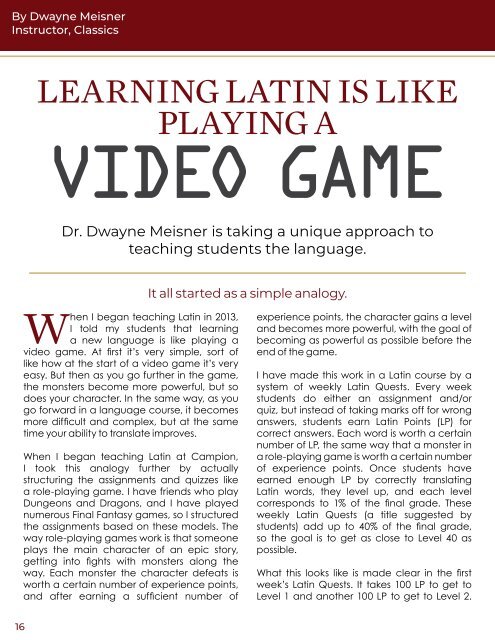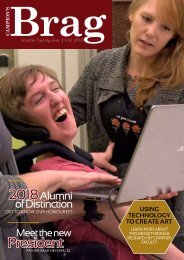Brag Fall 2021
Create successful ePaper yourself
Turn your PDF publications into a flip-book with our unique Google optimized e-Paper software.
By Dwayne Meisner<br />
Instructor, Classics<br />
LEARNING LATIN IS LIKE<br />
PLAYING A<br />
VIDEO GAME<br />
Dr. Dwayne Meisner is taking a unique approach to<br />
teaching students the language.<br />
It all started as a simple analogy.<br />
When I began teaching Latin in 2013,<br />
I told my students that learning<br />
a new language is like playing a<br />
video game. At first it’s very simple, sort of<br />
like how at the start of a video game it’s very<br />
easy. But then as you go further in the game,<br />
the monsters become more powerful, but so<br />
does your character. In the same way, as you<br />
go forward in a language course, it becomes<br />
more difficult and complex, but at the same<br />
time your ability to translate improves.<br />
When I began teaching Latin at Campion,<br />
I took this analogy further by actually<br />
structuring the assignments and quizzes like<br />
a role-playing game. I have friends who play<br />
Dungeons and Dragons, and I have played<br />
numerous Final Fantasy games, so I structured<br />
the assignments based on these models. The<br />
way role-playing games work is that someone<br />
plays the main character of an epic story,<br />
getting into fights with monsters along the<br />
way. Each monster the character defeats is<br />
worth a certain number of experience points,<br />
and after earning a sufficient number of<br />
experience points, the character gains a level<br />
and becomes more powerful, with the goal of<br />
becoming as powerful as possible before the<br />
end of the game.<br />
I have made this work in a Latin course by a<br />
system of weekly Latin Quests. Every week<br />
students do either an assignment and/or<br />
quiz, but instead of taking marks off for wrong<br />
answers, students earn Latin Points (LP) for<br />
correct answers. Each word is worth a certain<br />
number of LP, the same way that a monster in<br />
a role-playing game is worth a certain number<br />
of experience points. Once students have<br />
earned enough LP by correctly translating<br />
Latin words, they level up, and each level<br />
corresponds to 1% of the final grade. These<br />
weekly Latin Quests (a title suggested by<br />
students) add up to 40% of the final grade,<br />
so the goal is to get as close to Level 40 as<br />
possible.<br />
What this looks like is made clear in the first<br />
week’s Latin Quests. It takes 100 LP to get to<br />
Level 1 and another 100 LP to get to Level 2.<br />
16

















